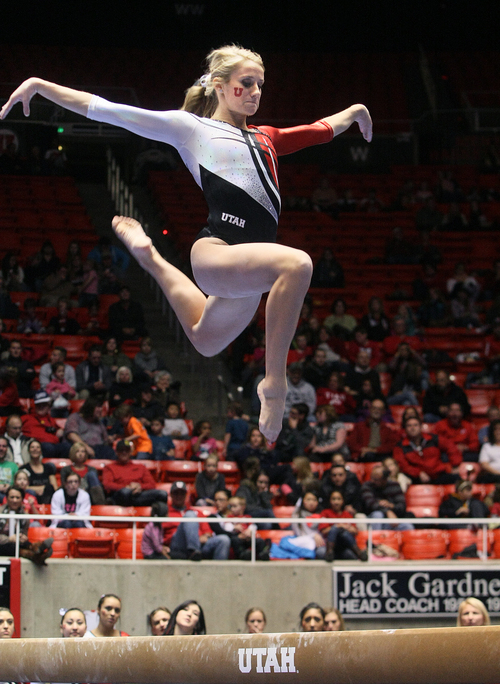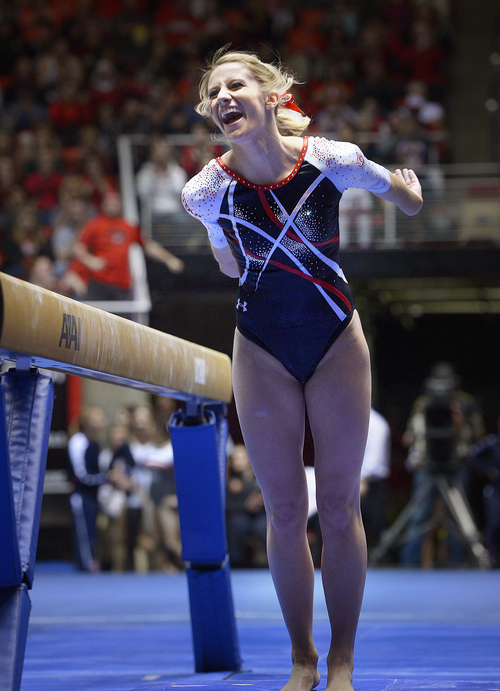This is an archived article that was published on sltrib.com in 2014, and information in the article may be outdated. It is provided only for personal research purposes and may not be reprinted.
Utah's gymnastics team has apparently paid its dues in gymnastics' karmic universe.
Following season after season of the Utes getting stuck with either starting or ending their NCAA competitions on the balance beam, the draws are working in the team's favor this season.
Utah, which won the Fayetteville regional on Saturday to advance to the NCAAs April 18-20, will start on the uneven bars and end on a bye, the NCAA announced Monday.
The rotation should be perfect for the Utes, since they are accustomed to starting on the bars at away meets and it allows them to finish on their best events — the vault and floor.
Senior Mary Beth Lofgren's eyes lit up as she talked about the rotation. Obviously, she had enough experiences suffering through on beam as the last event.
"I don't know what happened, but this is great," she said. "We know it works really well for us so we are excited about it."
Utah had almost the same rotation at the regional meet, when the Utes leapt from third to first thanks to their floor routines.
The only difference between that rotation and the one the Utes will have at nationals is Utah will end on a bye, not start on one.
That slight variation could play into Utah's favor more since it seemed having the bye first led to a sluggish start on Saturday, although Utah coach Greg Marsden emphasized the Utes needed to have a good start regardless of the rotation order.
"We have to have a better start than we had at regionals," he said. "Whether it was sitting through the bye or what, we have to come out a little better."
The Utes will compete against Alabama, Florida, UCLA, Nebraska and Penn State in the evening session on April 18th while Georgia, Stanford, LSU, Oklahoma, Michigan and Illinois compete in the afternoon.
The top three teams from each session advance to the Super Six to decide the national title. A quick glance of the sessions would suggest Utah's task is the more difficult, since Alabama will be competing less than an hour's drive from Tuscaloosa while Florida is the defending champion and UCLA is always tough to beat in the postseason.
However, Marsden said neither session looked easy to him.
"In both of them you are going to have to do well to move on," he said. "Hopefully we can have a strong start on the bars and beam then finish up well on our strong events."
The Utes crumbled on the balance beam last year and finished ninth — the worst finish by a Utah team since the Utes were 10th at the 1976 nationals sponsored by the AIAW.
Such a lowly distinction didn't sit well with the Utes, who used the finish as motivation this year. Now that their chance at redemption is less than two weeks away, senior Hailee Hansen said she and her teammates have a real shot at ending Utah's title drought.
The last time the Utes won a national championship was in 1995.
"We want to go into nationals and put it all out there and see where that gets us," she said. "Hopefully it will get us far. We have come a long ways since last year and it will be exciting to get there and finish out with the potential this team has." —
NCAA Gymnastics Championships
April 18-20, Birmingham, Ala.
April 18, Noon MDT • Georgia, Stanford, LSU, Oklahoma, Michigan, Illinois
April 18, 6 p.m. MDT • Utah, Alabama, Florida, UCLA, Nebraska, Penn St.
April 19 • Super Six, 5 p.m. MDT
April 20 • Individual finals, 1 p.m. MDT —
Opening event, session I
Vault • Georgia
Bye before bars • Illinois
Uneven bars • Michigan
Balance beam • Oklahoma
Bye before floor • LSU
Floor • Stanford
Opening event, session II
Vault • Florida
Bye before bars • Alabama
Uneven bars • Utah
Balance beam • UCLA
Bye before floor • Penn State
Floor • Nebraska







